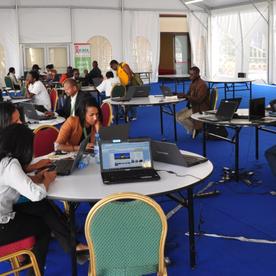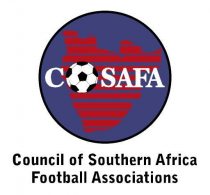 The just opened 16th ICASA has seen a lot people from different groupings, institutions and associations come together to share and learn the way forward in the HIV response, taking into account the Getting to zero new HIV infections theme of the global AIDS campaign.
The just opened 16th ICASA has seen a lot people from different groupings, institutions and associations come together to share and learn the way forward in the HIV response, taking into account the Getting to zero new HIV infections theme of the global AIDS campaign.
Community voices have interpreted with passion the ICASA theme of Own, scale-up and sustain in different ways, linking this to the impact of Global Fund Round 11 cancellation.
In terms of scaling up the programmes, the impact of the Global Fund Round 11 cancellation is massive. Accessibility to treatment has not been easy all along, now treatment accessibility will be even more limited. It is therefore high time for every country to take action in self financing and sustainability. The African communities feel that political leaders have not committed seriously to their promises if they can’t even fulfil the 15% budget allocation to health as per Abuja declaration.
Dorica Maguba, a volunteer and one of the Masambo beneficiaries of the Malawi Red Cross project in Mwanza district, Malawi says the Malawian government provides ARVs to PLHIV, supplementary food to those who are eligible, and distributes condoms. But other international organizations such as the Red Cross assist support groups of people living with HIV by giving them loans for farming and small scale businesses to reduce poverty.
“The fact that there is drug rationing in public clinics most of the time…is still a true story in our communities,” says Maguda. She called on PLHIV to be more involved in decision making bodies (as the saying goes Nothing about us without us).
Madam Beletu Mengistu, the Executive Director of The Integrated Service for AIDS Prevention and Support Organization (ISAPSO), a non governmental organization working with the community of Ethiopia, described ICASA as “the assembly of Africans for Africa to check on leadership commitment and research findings…a good platform for communities to share best practices as well as gaps identified in the HIV response.”
She added: “Most of the community programmes are from Africa, and we learn from the successes of brothers and sister from Africa not to repeat the same mistakes…the expectations these community activists [have] are to know and the see the efforts put in by all stakeholders to minimize new HIV infections.”
In the AIDS response, Ethiopian communities and the rest of African countries face a good number of challenges despite the antiretroviral therapy that people living with HIV (PLHIV) are now getting, but accessibility of these drugs it is still an obstacle to many. Also, the high illiteracy level among many people makes it difficult to understand the latest information on HIV and AIDS.
Generally the challenges are the same be it in Ethiopia or in Africa as whole; different interventions have at least proved to be working well in the response to the pandemic because now, even in rural areas, people have started talking about HIV prevention, treatment, care and support at family level. As a community organization, ISAPSO ensures that the methods used to disseminate HIV issues suit the communities to bring the most significant behavioral change in all people.



.jpeg&w=60&q=100&h=60)








